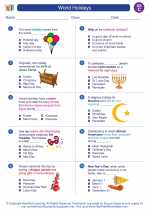Observance of Holidays -> cultural holidays
What are Cultural Holidays?
Cultural holidays are special occasions celebrated by a particular group of people based on their traditions, beliefs, and heritage. These holidays often reflect significant events, ideas, or figures in the culture's history. They are an essential part of a community's identity and are celebrated with various customs, rituals, and festivities.
Examples of Cultural Holidays
There are numerous cultural holidays celebrated around the world. Some examples include:
- Chinese New Year: A major celebration in China and other countries with significant Chinese populations. It marks the beginning of the lunar new year and is celebrated with dragon dances, fireworks, and family gatherings.
- Diwali: Also known as the Festival of Lights, Diwali is a significant holiday for Hindus, Sikhs, and Jains. It symbolizes the victory of light over darkness and is celebrated with fireworks, feasting, and the lighting of lamps.
- Cinco de Mayo: Celebrated mainly in the Mexican state of Puebla, Cinco de Mayo commemorates the Mexican Army's victory over the French Empire at the Battle of Puebla. In the United States, it has become a celebration of Mexican-American culture.
- Hanukkah: Also known as the Festival of Lights, Hanukkah is an eight-day Jewish holiday commemorating the rededication of the Second Temple in Jerusalem. It is celebrated with the lighting of the menorah, traditional foods, and games.
- Kwanzaa: Created in 1966, Kwanzaa is a week-long celebration honoring African heritage and culture. It includes activities such as lighting the kinara (candle holder), traditional African music and dance, and a communal feast.
Importance of Cultural Holidays
Cultural holidays play a vital role in preserving and promoting a community's cultural heritage. They provide an opportunity for people to connect with their roots, pass down traditions to younger generations, and foster a sense of belonging and unity within the community. Additionally, cultural holidays allow for the exchange of cultural knowledge and understanding among different groups of people, promoting diversity and mutual respect.
Study Guide for Cultural Holidays
If you are studying cultural holidays, here are some key points to focus on:
- Identify and describe the cultural holidays celebrated in different parts of the world.
- Explore the historical and cultural significance of each holiday.
- Examine the customs, traditions, and rituals associated with each holiday.
- Discuss the ways in which cultural holidays contribute to the preservation and promotion of cultural heritage.
- Consider the impact of cultural holidays on fostering cultural diversity and understanding.
By understanding and appreciating cultural holidays, we can gain valuable insights into the diverse and rich tapestry of human cultures around the world.
.◂Social Studies Worksheets and Study Guides First Grade. Observance of Holidays

 Worksheet/Answer key
Worksheet/Answer key
 Worksheet/Answer key
Worksheet/Answer key
 Worksheet/Answer key
Worksheet/Answer key
 Worksheet/Answer key
Worksheet/Answer key
 Worksheet/Answer key
Worksheet/Answer key
 Worksheet/Answer key
Worksheet/Answer key
 Worksheet/Answer key
Worksheet/Answer key
 Worksheet/Answer key
Worksheet/Answer key
 Worksheet/Answer key
Worksheet/Answer key
 Coloring Worksheet
Coloring Worksheet
